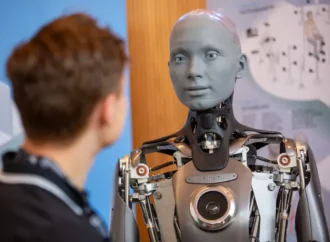Most of us are aware of how dangerous misinformation can be, whether it comes from “official” mainstream media sources or from the distant hinterlands of the internet blogosphere. Neither mainstream media nor alternative media, neither the left nor right, has a monopoly on truth, and oftentimes getting the real facts requires a careful process of sifting information, checking sources, and questioning biases.
Walking in the truth has always been difficult, and it’s become even more difficult with each successive expansion of the mass media and the increase in opinions swirling around our ears. We have more voices than ever to try to discern between, so we must be more careful than ever to avoid falsehoods.
Imbalance and Balance
But there’s a more subtle form of error that can creep into our thinking: imbalance. Imbalance is not the same as simple falsehood. In fact, someone suffering from unbalanced thinking may actually hold a lot of truth. The problem is that their understanding of the world is partial and fragmentary, thus leading to a tunnel vision in which one truth is emphasized to the exclusion of other, balancing truths.
Imbalance results from a lack of nuanced thinking, a refusal to make fine distinctions, and an inability to look at differing complementary – though not contradictory – perspectives.
Hyperfocus on a single truth invariably leads to a warped worldview because reality must be taken as a whole, as something integral and complete. Genuine truths are complementary to one another, all pointing toward the single, objective reality that surrounds us. Overemphasizing just one of those truths, attempting to explain everything by means of it, will distort the picture.
The antidote to imbalance is, of course, balance. Balanced thinking means that we accept the complexity of the world and the need to make fine distinctions in order to understand it rightly. The balanced thinker can listen carefully to a perspective and, with great precision, pick out the truth in it while discarding the error.
Balance does not mean believing in two directly opposite claims at the same time. Nor is balance relativism or subjectivism. But it might mean holding in tension two truths whose reconciliation isn’t immediately clear.
An Example
The neo-Marxism that’s so popular today includes a lot of imbalance mixed with falsehood. Neo-Marxists hyperfocus on cases of historical injustice and the abuse of power. Their concern is for minority victim groups – racial, sexual, or otherwise – whom they believe have been treated unjustly by society. They interpret politics, culture, economics, and more through the lens of these power dynamics in which a larger group tries to oppress a smaller group.
While this worldview contains some truth – for instance, injustice and oppression are not uncommon events in human history – it overemphasizes that single truth to an absurd degree. Neo-Marxism tries to explain everything (and justify further injustices) in terms of the oppressor vs. oppressed dynamic. That narrow perspective of power dynamics, while useful in some contexts, is pitifully inadequate to explain all of human history, culture, or politics.
Many conservatives rightly recognize the imbalance and error in a neo-Marxist worldview. But then they fall into a similar reductionism when they seek to explain everything wrong with modern politics, media, or education through the neo-Marxist mind virus.
What’s wrong with America today? “Communism,” they’ll say – or, if they’re being more precise, “neo-Marxist postmodernism.” The more extreme voices will attribute virtually every major event to a carefully planned plot by radical Marxist operatives implanted in the government. But this is tunnel vision, once again, only from the opposite side.
I believe there’s a lot of truth to the idea that neo-Marxism has infiltrated and severely damaged our institutions. There’s more truth in that claim than in claims made by the neo-Marxists themselves. But attributing all the evil of our society to this single source is overly simplistic. It fails to honestly grapple with the complex interplay of forces that shape the world.
Echo Chambers
The internet has likely worsened the problem of unbalanced thinking and tunnel vision, for it provides the perfect environment for echo chambers and confirmation bias. The internet, after all, runs on a capitalist model in which internet companies profit when they serve the right content to the right person. If someone is already inclined to view the world through a certain lens, the internet will probably deepen and confirm that person’s presuppositions because it’s designed to give the consumer what he or she wants.
For example, if you watch a lot of videos about how bad Marxism is, then YouTube will suggest more of them, because that’s how YouTube makes money. And so, in your mind, Marxism takes on larger proportions until it appears to be even more significant than it really is. Algorithms emphasize imbalances in our thinking.
It’s also human nature to seek confirmation of what we already believe. If what we believe is true, there’s nothing wrong with that, as long as we keep that truth in perspective. However, when it leads to a narrowing of the mind and a refusal to consider alternative explanations, we may end up trapped in an incomplete understanding.
Unfortunately, the internet is also excellent at giving us the confirmation and validation we seek. Whatever you’re looking for, it exists somewhere on the internet. And so through our own Google searches, seeking further evidence for what we already suspect, we may be unknowingly solidifying a perspective that doesn’t give the whole picture.
“It is always simple to fall; there are an infinity of angles at which one falls, only one at which one stands,” G. K. Chesterton wrote. In other words, we only stand in the clear light of truth when we have properly balanced what we know about the world, so that we receive an accurate reflection of reality.
Imbalance will cause us to stumble. Whenever we’re confronted with an explanation of events, we must be ready to “eat the meat and spit out the bones.” Rarely can an explanation or theory be either wholly embraced or wholly rejected. And it’s important to broaden our perspective through good reading and a wide education, not so that we end up equating truth and falsehood, but so that we gain a greater appreciation of the fullness of truth and can break out of our self-imposed mental limitations.
We do well to remember the medieval dictum: “never deny, seldom affirm, always distinguish.”
—
The republication of this article is made possible by The Fred & Rheta Skelton Center for Cultural Renewal.
Image Credit: Pexels
27 comments















27 Comments
esther lee
September 5, 2025, 7:11 pmUnbelievable ,Dr Ojogun brought back my ex within 48hours, after 3 year of divorce, what a wonderful and true spell caster. it's still like a dream to me. all thanks to Dr Ojogun all what he said come to pass he is a man of a words real and legit contact him On WhatsApp +2348154637647 And him Facebook page; https://www.facebook.com/drojogunspelltemple Or Email him [email protected]
REPLYJuniper Colbert@esther lee
September 6, 2025, 2:04 pmStart making cash right now… Get more time with your family by doing jobs that only require for you to have a computer and an internet access and you can have that at your home. Start bringing up to $2700-$4700+Dollar per week . I've started this job and I've never been happier and now I am sharing it with you, so you can try it too. You can check it out here…
Here is I started_______ https://Www.EarnApp1.Com
REPLYElisa Switzer@Juniper Colbert
September 6, 2025, 2:05 pmJOIN US Everybody can earn 250/h Dollar + daily 1K… You can earn from 6000-12000 Dollar a month or even more if you work as a part time job…It’s easy, just follow instructions on this page, read it carefully from start to finish… It’s a flexible job but a good earning opportunity. tab for more detail thank you……..
REPLYJust join This Website
——-⫸ https://Www.EarnApp1.Com
Kiera Sanderson@Juniper Colbert
September 6, 2025, 6:40 pmI am making over $25,000 a month working part time. I kept hearing other people tell me how much money they can make online so I decided to look into it. Well, it was all true and has totally changed my life. This is what I do. check it out by Visiting Following Link
COPY THIS→→→→ http://Www.Work99.Site
REPLYJimbeau@Kiera Sanderson
September 8, 2025, 6:07 amI get paid over 220 Dollars per hour working from home with 2 kids at home. i never thought i’d be able to do it but my best friend earns over 15k a month doing this and she convinced me to try. it was all true and has totally changed my life. This is what I do, check it out by Visiting Following Website…
REPLY.
.
HERE—————⊃⫸ https://Www.Cash43.Com
RSLewis@Juniper Colbert
September 8, 2025, 6:09 amGoogle is now paying $300 to $500 per hour for doing work online work from home. Last paycheck of me said that $20537 from this easy and simple job. Its amazing and earns are awesome. No boss, full time freedom and earnings are in front of you. This job is just awesome. Every person can makes income online with google easily….
REPLY.
More Details For Us→→ http://Www.Payathome9.Com
azith@esther lee
September 15, 2025, 7:08 amGoogle pay 500$ per hour my last pay check was $19840 working 10 hours a week online. My younger brother friend has been averaging 22k for months now and he works about 24 hours a week.
REPLYJust Open This Website…….. http://www.get.money63.com
MichelleRPellot
September 6, 2025, 3:23 amI get paid more than $120 to $130 per hour for working online. I heard about this job 3 months ago and after joining this i have earned easily $15k from this without having online working skills. This is what I do…….Www.Works6.Com
REPLYAngelica B. Davis
September 7, 2025, 5:52 amStart working from home! Great work for-Ever, Stay at Home Moms OR anyone needs an extra income. Get started. You only need a bgh computer and a reliable computer t late try……. https://Www.Paycash1.site
REPLYJosefa Stanton
September 7, 2025, 12:54 pmI’ve earned $17,910 this month by working online from home. I work only six hours a day despite being a full-time college student. Everyone is capable of carrying out this work from their homes and learning it in spare time on a continuous basis.
REPLYTo learn more, see this article———>>> https://www.jobs99.site
Susan Bickford
September 8, 2025, 8:31 amIt's A Great News to Celebrate with you Viewer, I am truly living the life I have been looking for after Dr Kachi made me win my Powerball Lottery, I had been playing for a good 8years. It was a friend of mine who directed me to Dr Kachi because my friend Nancy has won the Powerball so many times and I don't know how she got the match six numbers to play and win a very big amount of money, then the last time she won the Mega Millions I told her to tell me the secret on how she win. That's when she started telling me about the powerful Dr Kachi who has been her helper. and she gave me Dr Kachi Text/Call Number:+1 (209) 893-8075 I texted the greatest spell caster Dr Kachi and I told him I wanted to win my Powerball with his spiritual rightful number and he told me I should give him 2hours to get everything done and hopefully Dr Kachi do it, and give me a winning numbers to play my ticket that make me win the prize of $223.3 Million Dollars Powerball lottery Tuesday i bought the winning ticket at the Carlie C’s IGA store in Hope Mills, that changed my life for good today, and Dr Kachi a strong spell caster and trust him when he says the results will manifest it's Truth, God bless you Dr kachi for your kind help also can Email: [email protected] or website: https://drkachispellcaster.wixsite.com/my-site
REPLY